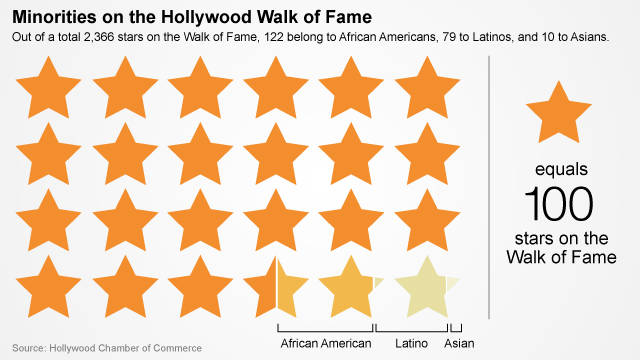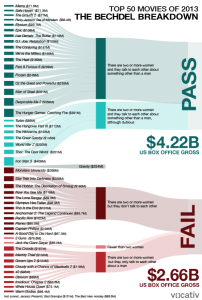Minority Representation
2,809 Oscar Statuettes have been awarded in the 85 years of the Academy Awards’s existence. Out of those 2,809, 38 have been awarded to Asian Americans, 29 have been to African Americans, and one has been to a Hispanic-American. Pooled together, that’s a little under 2.5 percent.
America is a country that prides itself on being a melting pot, a gloriously diverse country founded on the principles of freedom for all. Yet mainstream media continues to consistently cast Caucasian actors in lead roles in movies and tv-shows.
The discrepancy between what we live and what we see continues out of racial territory. Both women and the LGBT community are underrepresented in our entertainment; a National Public Radio (NPR) study shows that only 28 percent of speaking characters in last year’s movies were female.
As a Eurasian who appears more phenotypically Caucasian than Asian, I’ve been told before that my opinions on this issue are influenced by my having lived all my life with “white privilege.”
Ironically, the only discrimination I’ve ever experienced is from the choir members at Crystal Children’s Choir, an almost exclusively Chinese organization. My point is, being different from the norm is never fun, and I understand that.
So what do I want? The answer is obvious: more minority representation. But I also want so much more than that.
I want to live in a world, where an African American character in a leading role is just a lead, not a black lead. I want to see a gay character whose main conflict isn’t centered around his or her homosexuality. I want to watch an Asian character who isn’t a martial arts master or a nerd. I want to see an America where a kids movie starring two females isn’t newsworthy. I want minority characters whose ethnicity or sexuality doesn’t consume and override their personality.
Of course, a few movies and shows break the mold. Lucy Liu in “Elementary,” Mindy Kaling in “The Mindy Project,” and John Cho in “Star Trek” are a few examples.
But as much as those who yearn for diversity celebrate the little victories, the fact is that they’re still victories. We live in the 21st century, and in a community as diverse as Harker, it’s often hard to remember how parts of this country are struggling to catch up to the standard we’ve grown up with. Only one female director has ever won the academy award for “Best Director.”
Having representation in the media is incredibly important, not just so minorities feel more accepted, but because the media has a huge affect on how others view those minorities. Often times, a person’s only exposure to a minority group is through the media. My mother sometimes talks about how people have commented that she doesn’t seem Chinese because she doesn’t fit the stereotypes perpetuated by TV and movies.
However, the quest for minority representation is still a social movement, and social movements are not unanimously supported.
It is neither legislative nor ethically correct to force individuals to cater to one groups’ political views. The First Amendment protects free expression, so directors and writers can never have an obligation to put minority characters in their films and tv-shows.
The only way to change how and to what degree social and ethnic minorities are represented in the media is to change our culture to the point where having minorities is no longer a social decision. Our society seems to be moving in that direction; minorities have been featured with much greater frequency in the media lately, but are still often stereotypes instead of 3-dimensional characters.
So the question that presents itself to all of us as we seek out entertainment is this: how much do we care? How much are we willing to let our politics influence what we watch? For me, do I care about minority representation enough to boycott films and tv-shows lacking diversity?
The short answer is no. As much as I want more diverse characters, representation is not the deciding factor for me as to whether or not I like something. It’s a factor, but plot and theme take precedence.
So as I watch “Frozen” for the third time, the main characters’ ethnicity won’t stop me from enjoying the movie’s satirical glory, but I’ll still wish that Elsa and Anna were more than two more thin, white Disney Princesses.

Meilan Steimle (12) is co-Editor-in-Chief of the Winged Post. She was a reporter her freshman year, Winged Post Opinion Editor her sophomore year and Winged...


















![“[Building nerf blasters] became this outlet of creativity for me that hasn't been matched by anything else. The process [of] making a build complete to your desire is such a painstakingly difficult process, but I've had to learn from [the skills needed from] soldering to proper painting. There's so many different options for everything, if you think about it, it exists. The best part is [that] if it doesn't exist, you can build it yourself," Ishaan Parate said.](https://harkeraquila.com/wp-content/uploads/2022/08/DSC_8149-900x604.jpg)




![“When I came into high school, I was ready to be a follower. But DECA was a game changer for me. It helped me overcome my fear of public speaking, and it's played such a major role in who I've become today. To be able to successfully lead a chapter of 150 students, an officer team and be one of the upperclassmen I once really admired is something I'm [really] proud of,” Anvitha Tummala ('21) said.](https://harkeraquila.com/wp-content/uploads/2021/07/Screen-Shot-2021-07-25-at-9.50.05-AM-900x594.png)







![“I think getting up in the morning and having a sense of purpose [is exciting]. I think without a certain amount of drive, life is kind of obsolete and mundane, and I think having that every single day is what makes each day unique and kind of makes life exciting,” Neymika Jain (12) said.](https://harkeraquila.com/wp-content/uploads/2017/06/Screen-Shot-2017-06-03-at-4.54.16-PM.png)








![“My slogan is ‘slow feet, don’t eat, and I’m hungry.’ You need to run fast to get where you are–you aren't going to get those championships if you aren't fast,” Angel Cervantes (12) said. “I want to do well in school on my tests and in track and win championships for my team. I live by that, [and] I can do that anywhere: in the classroom or on the field.”](https://harkeraquila.com/wp-content/uploads/2018/06/DSC5146-900x601.jpg)
![“[Volleyball has] taught me how to fall correctly, and another thing it taught is that you don’t have to be the best at something to be good at it. If you just hit the ball in a smart way, then it still scores points and you’re good at it. You could be a background player and still make a much bigger impact on the team than you would think,” Anya Gert (’20) said.](https://harkeraquila.com/wp-content/uploads/2020/06/AnnaGert_JinTuan_HoHPhotoEdited-600x900.jpeg)

![“I'm not nearly there yet, but [my confidence has] definitely been getting better since I was pretty shy and timid coming into Harker my freshman year. I know that there's a lot of people that are really confident in what they do, and I really admire them. Everyone's so driven and that has really pushed me to kind of try to find my own place in high school and be more confident,” Alyssa Huang (’20) said.](https://harkeraquila.com/wp-content/uploads/2020/06/AlyssaHuang_EmilyChen_HoHPhoto-900x749.jpeg)




